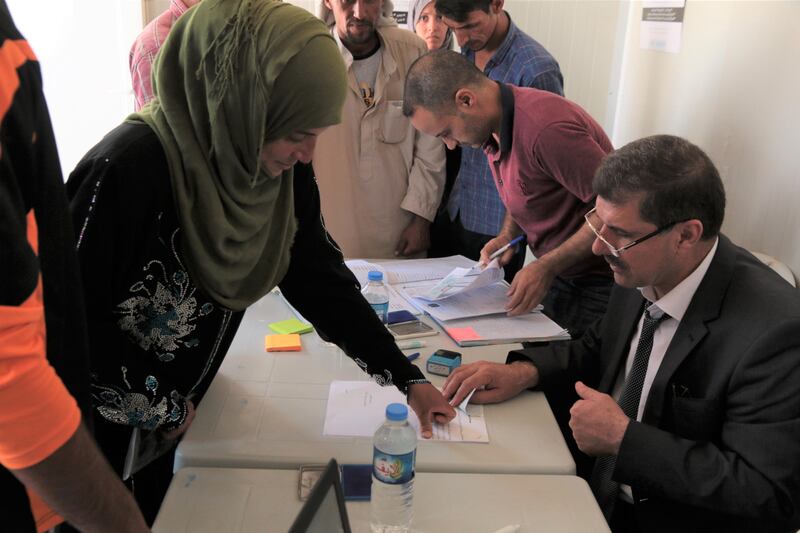When Jassem Mohammed and Najla Hamed tied the knot in 2014, dark times had already befallen their native village of Zanazel. Only three weeks earlier, ISIL militants had unexpectedly stormed the nearby city of Mosul, and the entire area, including Zanazel, came under the control of the terror group.
Jassem, now 21, and Najla, 22, decided to go ahead with the wedding anyway.
They spent the first three years of married life in the jihadists' self-proclaimed Islamic State, where the laws and institutions of the Iraqi government were rendered meaningless.
In its attempt to create a lasting successor to the government in Baghdad, ISIL established its own bureaucracy to administer the millions of people under its rule. Marriages had to be registered at an ISIL court, otherwise the couples would not be entitled to the public services that were controlled by the insurgents.
Jassem and Najla did not approve of ISIL and never registered their marriage with the group. Their principled stand soon proved problematic. Shortly after their marriage, Najla became pregnant and gave birth to a girl. A year later, a boy was born.
But because they had rejected the insurgents' bureaucracy, Jassem could not take his wife to hospital to give birth.
"We couldn't go to the hospital because we were not registered as married, so a midwife came and Najla delivered at home," said Jassem.
The young family was also deprived of additional food rations distributed by ISIL, but Jassem and Najla held firm and bided their time. In October 2016, the Iraqi military launched its operation to retake Mosul and the surrounding territory.
In a drawn-out battle, Iraqi forces finally reached Zanazel the following spring, and the family fled to escape the fighting. They ended up in the sprawling Hassansham Camp near Mosul.
Here, they finally got the chance to make their marriage official. Once a week, Iraq's judiciary reaches out to the hundreds of thousands of displaced people moored in dusty camps in Kurdish-controlled territory near Mosul. Every Thursday, a judge and a judicial clerk from Nineveh governorate come and set up shop in a container in the midst of tents.
The judge tours the camps scattered on the plains near Mosul, and this week, Hassansham is the destination. There is no shortage of work.
According to the International Organisation for Migration (IOM), more than 800,000 people have been displaced by the battle to retake Mosul, Iraq's second largest city, from ISIL.
More than 600,000 remain in the camps even now, even though the guns fell silent in Mosul by mid-July. Many of them are in parts of Nineveh province that fell to Kurdish forces after ISIL was expelled.
It is difficult for the displaced to cross the internal border out of the autonomous Kurdish zone, and the only way for new documents to be issued is for the courts to come to them.
Around 8,000 couples are seeking to have their marriage registered, says Anam Showani, a lawyer working with Qandil, an NGO that conceived the idea of the mobile courts and helps organise the visits.
Marriage certificates mean access to better rations in the camps. They also allow couples to register their children, even though that has to be done in Mosul, greatly complicating that next step.
Until their parents make it to an Iraqi court, Jassem's and Najla's two children are not registered as Iraqi citizens. Camped out in territory claimed by the autonomous Kurdish government, they are essentially stateless.
The huge backlog of unregistered marriages is only slowly being processed. The mobile court only issues 20 to 25 documents each time it comes to a camp for a few hours, says Mr Showari.
Qassim Hassem, 21, and his 26-year-old wife, Shama Qassim, are from the village of Tel Salat near the town of Tal Afar, one of the last ISIL strongholds in Iraq. They also registered their marriage with the mobile court in Hassansham.
The battle to liberate Tal Afar got underway last week, but Qassim and Shama were displaced in October last year when government-aligned militia groups encircled the town. They fled the fighting by moving to ISIL-held west Mosul, where the front line caught up with them this spring and they were liberated by Iraqi forces. With their home still in a war zone, they ended up in Hassansham.
Qassim and Shama did not resist the insurgents' attempt to recreate a state bureaucracy. When they got married shortly after the terror group took over their village, they registered their union at an ISIL court.
"We had to do it, otherwise we could not have moved freely," Qassim says.
The couple brought the ISIL wedding certificate with them to the courtroom-in-a-container to support their case. The document bearing the terror group's infamous black emblem does not impress the judge. He asks the couple a few questions before issuing a legal Iraqi certificate while the clerk notes down their details in a thick ledger.
Relieved, Qassim and Shama step out of the container, their wedding legal at last. There is not much scope for celebration for the cash-strapped couple.
"We will have a small meal with our relatives," Qassim says. "The wedding celebration we had after we married under Daesh was bigger, we had more money then."





